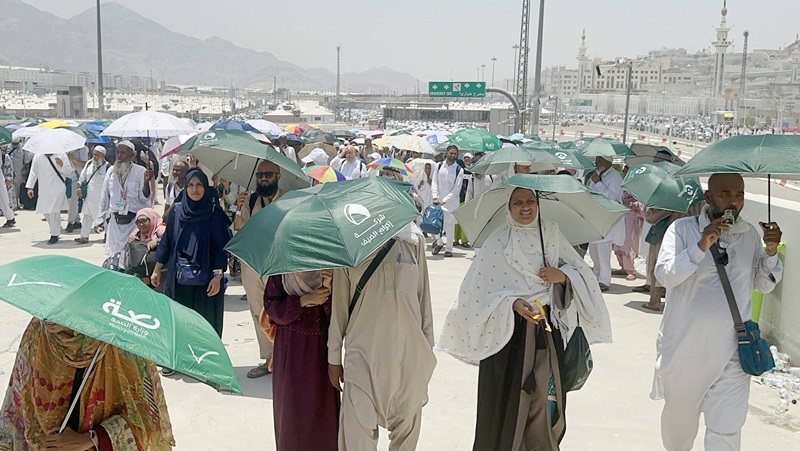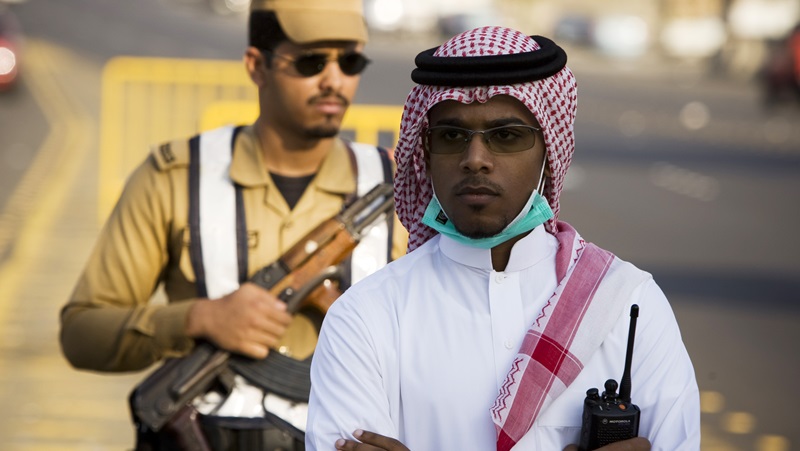Pilgrims without the right type of visa were denied medical treatment, survivors say, during a 52C heatwave which killed hundreds
A Saudi visa crackdown left Hajj pilgrims feeling unable to ask for help in a killer heatwave, survivors and the families of the dead told Climate Home.
For the first time this year, Saudi authorities required all pilgrims to wear identification on a “Nusuk Card” around their neck, allowing security forces to check they had the Hajj visa. Banners and phone messages warned against attending Hajj without this visa and many breaching these rules were deported.
A government-controlled Youtube channel said before the Hajj that the Nusuk Card “enables access to urgent medical care” and one survivor told Climate Home that, despite feeling tired and dizzy, he felt unable to ask for medical help for fear of punishment and deportation because he only had a tourist visa.
Temperatures in Mecca reached 51.8C this year, an unusually high figure which Climatemeter scientists have said was “mostly exacerbated by human-driven climate change”.
Over 1,300 people died during the heatwave and more than four-fifths of them were without official permits, according to Saudi Health Minister Fahad Al-Jalajel. Foreign governments have largely blamed travel agents for facilitating these irregular pilgrimages, while the Saudi authorities and climate change have mostly escaped blame.
One of those without a permit was Ibrahim, a retired Egyptian head teacher. To dodge visa checks, he walked 19 km in the baking heat to Arafat, a sacred hill near Mecca. He told Climate Home that he had asked buses carrying pilgrims with permits to stop and take him “but no one stopped, no one helped us”.
#No_Hajj_without_a_permit because services are directly linked to it, and accessing the Holy Sites without a permit is a violation that merits legal consequences.#Makkah_and_Madinah_Eagerly_Await_You#No_Hajj_without_a_permit#Hajj_1445H pic.twitter.com/aapODeC018
— Ministry of Hajj and Umrah (@MoHU_En) May 22, 2024
Fahad Saeed, a Pakistani climate scientist with Climate Analytics, told Climate Home: “The Hajj pilgrimage is a profound reminder to every Muslim of equality in the eyes of God. Yet, the disparity in the safety of pilgrims based on their financial means starkly contradicts this spirit of equality.”
Two-tier system
The city of Mecca is where the founder of Islam, the Prophet Muhammad, was born and lived most of his life. One of the religion’s five central pillars is that all believers should, if they’re healthy and can afford it, visit the city at least once on a pilgrimage known as Hajj and carry out a series of rituals.
Since Muhammad’s time, Islam has expanded across the globe and is now the religion of about a quarter of the world’s people. As the Hajj takes place for a single five-day period each year, there are far more people wanting to take part than the city can handle. Over 1.5 million pilgrims arrived in Mecca for the event last June.
Beyond lithium: how a Swedish battery company wants to power Europe’s green transition with salt
Official visas to enter Mecca during the Hajj are rationed through a lottery system, working with specialist travel agencies. But some travel agents also advise pilgrims on how to enter Mecca without an official visa.
That was how Ibrahim, who had been saving up for the Hajj for thirty years, got to Mecca. He did not want to reveal his second name out of fear of the Saudi government’s punishment.
He told Climate Home that he couldn’t afford an official visa 500,000EGP ($10,000). He entered Saudi Arabia with a normal tourist one and, with the help of a tourism company, he was able to bribe his way through checkpoints into Mecca.
He found accommodation in the suburb of Al-Aziziyah but authorities quickly raided the area before the start of Hajj. Many pilgrims without official visas were fingerprinted and deported but Ibrahim was just driven out of the city towards Jeddah.
For 1,000 Riyals ($267), he found a taxi to take him back to Al-Aziziya where he hid until the first day of Hajj. This is the pilgrimage’s most important day when pilgrims spend a day next to Mount Arafat, where Prophet Muhammad delivered his Farewell Sermon. There, they pray and ask for forgiveness.
Most pilgrims get buses from Mecca to Arafat but, worried about soldiers searching these buses, Ibrahim and his companions made the 19 km journey on foot. When he got there, the area was crowded and the temperature reached nearly 50C (122F).
The 62-year old said he began to feel exhausted and dizzy even though he was not fasting that day. “My foot, which had undergone three surgeries before, felt like a piece of fire. I could not walk”, he said.
Standing up in the heat lessens the blood flow to the brain, which can cause fainting but also heart or kidney failures, explained Mike Tipton, a British professor who advises athletes and soldiers on heat.

Muslim worshippers make their way to cast stones as part of a symbolic stoning of the devil ritual on June 18, 2023. (Photo: Medhat Hajjaj/apaimages)
Ibrahim said that getting water for him was difficult and that he did not want to ask the clinics along the road to Arafat for medical help because of his lack of visa. “We saw the bodies of pilgrims on the road in need of help,” he said, “some of them were dead, some were suffering from heat exhaustion and no one was helping them”.
The claim that irregular pilgrims were denied help has been made by many, including the official spokesperson for pilgrims from Iraq’s autonomous Kurdistan region Karwan Stoni, who told Agence France Presse they could not access air-conditioned spaces that the authorities had made available.
Ibrahim survived, completed his Hajj and returned to Egypt. But Jordanian cousins Tariq, 48, and Hossam Al-Bustanji, 52, were not so lucky. Their cousin Ahmed told Climate Home that their companions told him they died after walking about for seven or eight hours without any services.
“They fell and pleaded for water but no one helped
Read More

